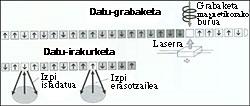Numerical sound is not a dream
It is clear that what we heard on the compact disc is of good quality, but when we have to record something we have to go to the classical methods, since the compact discs do not allow to record.

The Japanese company Sony wants to publish a “minidisco” by the end of this year. The mini-disc is a compact disc, therefore based on laser technology. It is five times smaller than the compact disc and supports a recording of 74 minutes, that is, similar to the compact disc.
How is it possible?
The disc is basically an optical disc, but a magnetic layer has been added. Therefore, the reader has a laser head and a magnetic head. The operating base consists of the demagnetization capacity of the magnetic layer when heated. The heating is due to the laser beam, reaching a temperature of 180 ° C. At that time the magnetic head polarizes this part. When turning the disc, the heated part cools down, but its magnetic polarity will be 0 or 1. This magnetic field is generated by a coil inside the reader head.
Therefore, the data is recorded more solidly than in the magnetic base and as at the time of reading only the laser head is used, no physical contact occurs. Consequently, the duration of the data, in this case the music, is much longer.
As for prices, the reader and the albums will currently have a sales price similar to that of the CD and its reader, and there are already many music houses that have started recording in this new medium.






